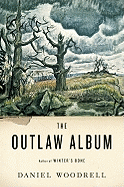
In his first story collection, the acclaimed author of Winter's Bone inverts Melville's white whale metaphor. Civilization, not brute nature, is the Moby Dick of Woodrell's arid, land-locked universe. His outlaws--disciples of Ahab--are hell-bent on erasing history and destroying the cultural values of anyone who appears foreign or merely different.
"Returning the River" illustrates the literal destruction of home and community if one, blindly heeding F. Scott Fitzgerald's lush epitaph, were to be "borne back ceaselessly into the past." "Woe to Live On," probably the most resonant story, takes the opposite approach: a Dutch-German immigrant and ex-Confederate soldier, in his zeal for complete assimilation, literally and figuratively murders his past, only to realize that his inheritance is the bitter taste of sawdust. Woodrell's modern American males, who have run out of frontiers to conquer, are hemmed in by tradition and diversity. In "The Echo of Neighborly Bones," a character from the Missouri Ozarks calls his neighbor "a foreigner" simply because the latter comes from Minnesota. In "Two Things," a long-suffering father disavows his prodigal son's salvation through poetry. Woodrell fills Outlaw Album with startling sentences that capture his rustic brand of American gothic: "Once Boshell finally killed his neighbor he couldn't seem to quit killing him"; "She has always carried on... hefting the parts of herself that remained... and remaining more decent than she had to be"; and "[T]oo much footwear and no clarity! clarity!"
On another level, Woodrell's Missouri backwoods evokes Camus' French Algiers, and even Babel's Odessa. It's no mystery why President Obama picked Woodrell's work to read on his vacation. The author's portrayal of American discontent mirrors global unease--we are both alienated from and emblematic of an era in which fundamentalists clash deeply with outliers. --Thuy Dinh, editor, Da Mau magazine

